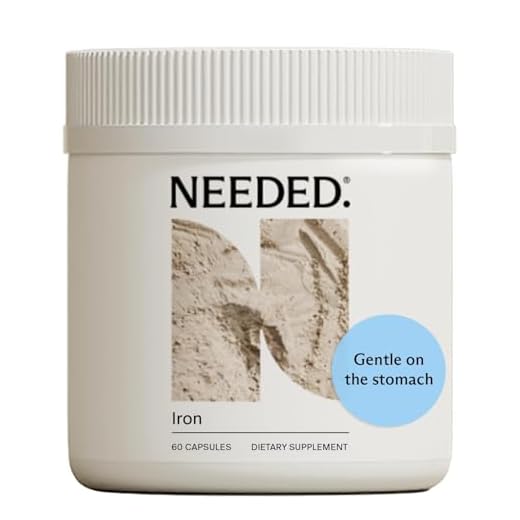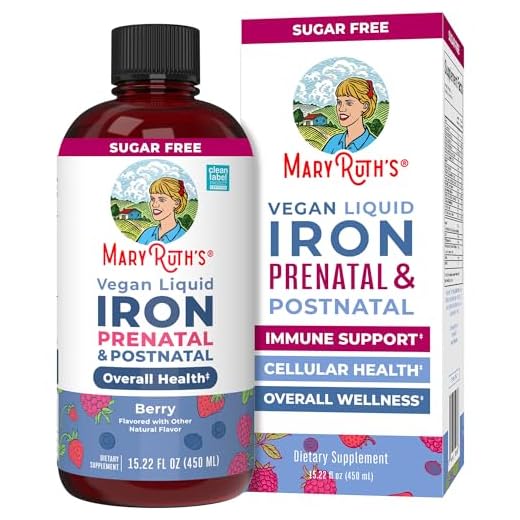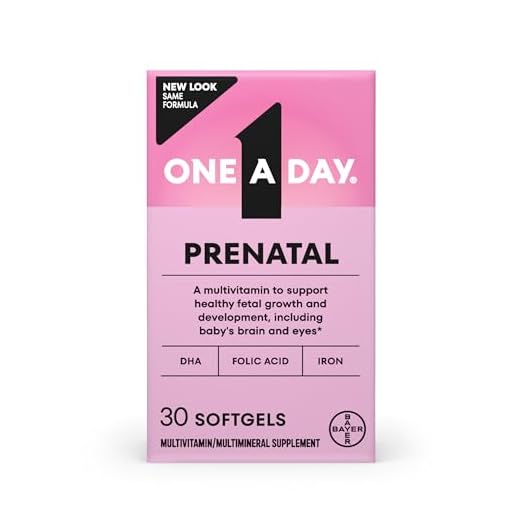







Prenatal vitamins can markedly reduce your risk of anemia during pregnancy. They typically contain around 27 mg of iron, which is vital for red blood cell production and addressing increased iron demands from fetal growth and higher blood volume. Additionally, many prenatal vitamins include vitamin C, enhancing iron absorption from your diet. This combination helps maintain healthy iron levels, fundamental for both your wellbeing and your baby's health. Regular monitoring of your iron status during prenatal visits guarantees timely interventions if needed. Discovering further details on maintaining ideal iron levels can help you navigate this important aspect of pregnancy.
Key Takeaways
- Prenatal vitamins containing approximately 27 mg of iron help meet the increased iron demands during pregnancy, reducing anemia risk.
- Adequate iron intake through prenatal vitamins supports red blood cell production, essential for preventing iron deficiency anemia.
- Prenatal vitamins often include vitamin C, which enhances iron absorption from both supplements and dietary sources.
- Regular anemia screening during prenatal visits, combined with prenatal vitamins, allows for timely detection and management of iron deficiency.
- A balanced diet paired with prenatal vitamins optimizes overall nutritional status, further decreasing the likelihood of anemia in pregnant women.
Overview of Iron Deficiency Anemia
Iron deficiency anemia is a common condition during pregnancy, affecting approximately 28% of women in their third trimester. This prevalence is primarily due to the increased iron demands for fetal growth and the higher blood volume that occurs during pregnancy. If you experience symptoms like fatigue, weakness, dizziness, or shortness of breath, it's vital to discuss these with your healthcare provider, as they can greatly impact both maternal health and fetal development.
Severe iron deficiency anemia can lead to increased risks of premature birth and low birth weight, which can have long-term effects on your baby's health. Regular screening for anemia during prenatal visits is essential, as it allows for early detection and management. If you're diagnosed with iron deficiency anemia, iron supplementation may be recommended to replenish your iron levels.
Prenatal vitamins, typically containing around 27 mg of iron, are designed to help prevent the onset of anemia by meeting your increased iron needs. Remember, untreated anemia can lead to serious health complications for both you and your baby, emphasizing the importance of monitoring your iron levels throughout your pregnancy.
Role of Prenatal Vitamins
To effectively manage iron deficiency anemia during pregnancy, incorporating prenatal vitamins into your daily routine is imperative. Prenatal vitamins typically contain around 27 mg of iron, meeting the increased requirements during this pivotal time. This iron is essential for the production of red blood cells, which helps prevent anemia. Many prenatal vitamins also include vitamin C, enhancing iron absorption from both supplements and dietary sources, thereby improving your overall iron levels. Adequate intake of key nutrients such as folic acid and iron is critical to minimize risks associated with anemia during pregnancy.
Research supports the effectiveness of prenatal vitamins in reducing anemia rates; for instance, a study found that direct dispensing of iron supplements led to a decrease in anemia prevalence from 18% to 11%. Additionally, prenatal vitamins often provide essential folate, which not only supports neural tube development but also plays a role in red blood cell production, further contributing to anemia prevention.
Healthcare providers recommend that all pregnant women take prenatal vitamins to guarantee adequate intake of essential nutrients, particularly iron and folate, necessary for ideal maternal health and fetal health. By prioritizing these vitamins, you can meaningfully reduce the risk of anemia and promote better health outcomes for both you and your baby.
Dietary Sources of Iron
Incorporating iron-rich foods into your diet is essential for meeting the heightened iron demands during pregnancy. Lean meats, fish, beans, lentils, fortified cereals, and leafy greens are pivotal for increasing your iron intake and preventing anemia. For instance, spinach is particularly high in both iron and folate, making it a beneficial choice. Additionally, ensuring an adequate intake of essential vitamins for placental health can further support your body's iron absorption and overall well-being during this critical time.
Breakfast cereals often come fortified with iron and folic acid, providing an easy way to enhance your daily iron intake. To optimize the absorption of non-heme iron, which is found in plant-based foods, pair these sources with vitamin C-rich options like citrus fruits and raw vegetables. This combination can greatly improve your body's ability to absorb iron, thereby supporting your overall health during pregnancy.
Maintaining a balanced diet that incorporates a variety of nutrient-dense foods not only helps to boost your iron levels but also reduces the need for supplements. By prioritizing these dietary sources of iron, you can effectively mitigate the risks associated with inadequate iron intake during pregnancy, ensuring a healthier experience for both you and your baby.
Symptoms of Anemia in Pregnancy
Anemia can manifest in various ways during pregnancy, with common symptoms including fatigue, weakness, and dizziness. These symptoms can markedly impact your daily activities and overall well-being. Additionally, you might notice physical signs such as pale or yellowish skin, shortness of breath, and a rapid heartbeat, particularly during exertion. Prenatal vitamins, particularly those rich in iron, are vital in helping to prevent these symptoms by supporting increased nutritional needs during pregnancy and guaranteeing adequate nutrient absorption for both mother and fetus. In some cases, pregnant women may experience unusual cravings for non-food items, known as pica, which can indicate severe iron deficiency anemia. Recognizing these symptoms is important, as severe anemia can lead to serious complications like premature birth and low birth weight, ultimately affecting both maternal and infant health outcomes.
Regular screening for anemia through blood tests is vital during prenatal visits. These tests help guarantee early detection and management of anemia symptoms, allowing for timely intervention. You should discuss any symptoms or concerns with your healthcare provider to receive appropriate guidance. Incorporating prenatal vitamins into your routine can also play a role in managing iron levels and reducing the risk of anemia during pregnancy, as they provide essential nutrients for fetal development and overall health. Being aware of these symptoms will empower you to take charge of your health and seek the necessary support.
Prevention Strategies
Effective prevention strategies are essential for reducing the risk of iron deficiency anemia during pregnancy. One of the most effective methods is taking prenatal vitamins, which typically contain 27 mg of iron—the recommended daily intake to meet increased demands due to fetal growth. This supplementation considerably improves hemoglobin levels, lowering the risk of anemia. Additionally, ensuring an adequate intake of key nutrients for lactation can support overall maternal health during this vital time.
Incorporating vitamin C-rich foods alongside prenatal vitamins can further enhance iron absorption from both supplements and dietary sources, aiding in anemia prevention. Aim to include a balanced diet filled with iron-rich foods like lean meats, beans, and fortified cereals. This thorough approach not only supports your body's iron needs but also contributes to your overall health during pregnancy.
Additionally, regular screening for anemia during prenatal visits is essential. It allows for early detection and timely intervention, ensuring that dietary modifications or iron supplementation can be implemented if needed. By prioritizing these prevention strategies, you can effectively minimize your risk of anemia, supporting both your health and your baby's development throughout pregnancy.
Importance of Regular Monitoring
Regular monitoring of hemoglobin and ferritin levels during pregnancy is essential to preventing and managing iron deficiency anemia. By regularly evaluating your iron status, healthcare providers can detect potential deficiencies early, particularly since hemoglobin levels below normal ranges indicate anemia risks. Routine screenings during prenatal visits allow for timely interventions, which may include dietary modifications or iron supplementation.
The prevalence of anemia can reach approximately 28% in the third trimester, underscoring the need for consistent monitoring throughout your pregnancy. This is especially important for high-risk populations, such as those with a history of anemia or closely spaced pregnancies. By keeping an eye on your hemoglobin and ferritin levels, you can better manage your iron levels and reduce the likelihood of complications.
Regular monitoring not only helps identify trends in iron deficiency but also allows for adjustments to your prenatal vitamins and overall diet. Effective management of iron deficiency is critical for ideal maternal health and fetal development. With proactive measures and open communication with your healthcare provider, you can guarantee that you're taking the necessary steps to maintain healthy iron levels throughout your pregnancy.
Conclusion
In summary, while you might think avoiding prenatal vitamins could save you a few bucks, that could ironically lead you straight into the arms of iron deficiency anemia. By embracing these supplements and focusing on iron-rich foods, you not only boost your health but also guarantee your little one gets the best start possible. So, don't skip those vitamins—your future self (and baby) will thank you for it, even if you end up with an extra bottle on your shelf!



